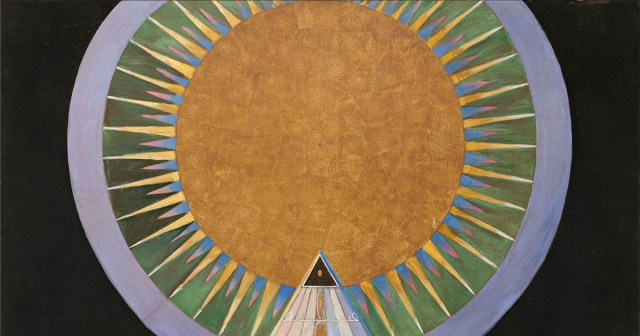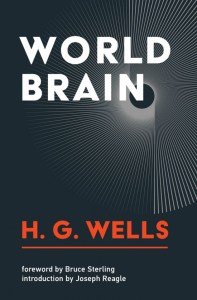
Science fiction writer and futurist H.G. Wells famously predicted the airplane, the tank, space travel, the atomic bomb, satellite television and the worldwide web.
The latter concept crops up repeatedly in a series of talks and essays from 1937, in which Wells proselytized for what he called a World Brain.
MIT Press has published these lectures in a new edition of H.G. Wells’ “World Brain,” along with related material Wells presented as magazine articles and radio addresses.
In them, Wells conceives of a World Encyclopedia — a repository of scientifically established knowledge — that would spread enlightenment around the world and lead to world peace.
Wells was imagining something like a pre-digital Wikipedia. The World Encyclopedia would provide a summary of verified reality (in about forty volumes); it would be widely available, free of copyright, and utilize the latest technology.
Of course, as Bruce Sterling points out in his foreword to this new edition of Wells’ work, the World Brain didn’t happen; the internet did. And yet, Wells anticipated aspects of the internet, envisioning the World Brain as a technical system of networked knowledge (in Sterling’s words, “a hypothetical super-gadget”). Wells’ optimism about the power of information might strike readers today as naïvely utopian, but possibly also inspirational.
“Instant access to the sum of human knowledge has allowed far-flung, like-minded people to find each other and coalesce into supportive communities. But it has also enabled people to retreat deeper into their own ideological silos.”
— Diana Gitig
He also argued for rearranging both education and the distribution of knowledge and thought we should probably get rid of nationalism while we’re at it.
In an article about the new publication at Ars Technica, science writer Diana Gitig explains Wells’ thinking.
If only everyone had the same education, the same knowledge, the same understanding of what was important — if only everyone knew the truth — it was inevitable that we’d form a productive, peaceful, global society, Wells thought. Conversely, without his educational reforms, Wells felt there was no way we’d transcend the mess of grubby, meaningless insularities that is our civilization.
“Wells wanted a Permanent World Encyclopedia to collate, standardize, assess, and continually revise the bulk of human knowledge,” writes Gitig. “He wanted knowledge and its dissemination to be centralized” as the basis for an improvement in education and therefore, in Wells’ words, “a reconditioned and more powerful public opinion.”
Patriotism threatens to destroy civilization, he said; kids should be learning what archeologists and anthropologists are deducing every day about the earliest cultures rather than their own particular nationalistic versions of history. As people age and grow, they can specialize, always learning about the latest developments in every field from the constantly updated World Encyclopedia.
READ MORE: H.G. Wells’ “World Brain” is now here—what have we learned since? (Ars Technica)
Wells had form when it came to socially progressive ideas. A set of letters published in 1940 as “The Rights of Man; Or What Are We Fighting For?” argued that the only meaningful outcome for the war would be the declaration of an agreed set of universal human rights and an international court to enforce them.
Yet socialist writer George Orwell criticized Wells for advocating a top-down global education system and curriculum. In a 1941 tract titled “Wells, Hitler and the World State,” the author of 1984 argued that Germany had a society in which everyone thinks similarly and along scientific lines but it was run by a “criminal lunatic” — a Big Brother monopolizing knowledge which Wells doesn’t seem to have anticipated.
“Wells wanted a Permanent World Encyclopedia to collate, standardize, assess, and continually revise the bulk of human knowledge.”
— Diana Gitig
EXPLORING ARTIFICIAL INTELLIGENCE:
With nearly half of all media and media tech companies incorporating Artificial Intelligence into their operations or product lines, AI and machine learning tools are rapidly transforming content creation, delivery and consumption. Find out what you need to know with these essential insights curated from the NAB Amplify archives:
- This Will Be Your 2032: Quantum Sensors, AI With Feeling, and Life Beyond Glass
- Learn How Data, AI and Automation Will Shape Your Future
- Where Are We With AI and ML in M&E?
- How Creativity and Data Are a Match Made in Hollywood/Heaven
- How to Process the Difference Between AI and Machine Learning
Gitig’s point in highlighting the World Brain publication is that things haven’t worked out as the great futurist hoped. The Permanent World Encyclopedia sounds a lot like Wikipedia, “but we made the whole rest of the Internet alongside it, which grants everyone access to at least as many lies as it does truth.”
Gitig says, “Instant access to the sum of human knowledge has allowed far-flung, like-minded people to find each other and coalesce into supportive communities. But it has also enabled people to retreat deeper into their own ideological silos.”
Greater knowledge hasn’t in the end lead to world peace — although there’s been no third world war. Without the collective will to regulate untruth out of the internet and in the absence of a benign supreme being (not withstanding the ambition of a Zuckerberg or Google) civilization’s quest for utopia continues…


